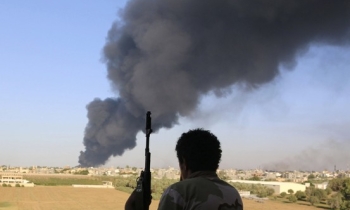The Supreme Court of Nepal has asked the government to furnish written replies over the controversial media ordinance issued by King Gyanendra and a subsequent midnight raid conducted on a private FM radio station by the police.

Chief Justice Dilip Kumar Poudel yesterday issued the showcause notice with a deadline of 15 days in response to a writ filed by nine professional organisations and the Kantipur FM, which was raided by the police last Friday.
The apex court, however, did not issue a stay order as was sought by the petitioners. The decision on whether or not to issue a stay order would be made only after a hearing on October 30, said the single bench headed by the Chief Justice.
Chief Justice Poudel told media personnel to go to court directly if the government interfered with FM radio stations or other media. He also expressed his belief that the government will not interfere in the media sector from now on.
In a writ petition filed at the Supreme Court on Sunday, Binod Raj Gyawali, Director of Kantipur FM Pvt Ltd, had sought a stay order to stop the government from implementing the recently promulgated media ordinance and to nullify the ordinance that bars FM stations from broadcasting news. The writ also sought the court's order to help return the equipment seized by the government for usual transmission of news through the FM's station at Bhedetar, Dhankuta in eastern Nepal.
"The Ordinance contravenes constitutional provisions on Articles 11, 12, 13, 14, 16, 18, 22 and 72. So the ordinance should be nullified," the petitioners pleaded. The provisions are related to right to equality, freedom of expression and speech, right to print and publications, right to information and other freedoms. Besides, the law enacted by parliament through its exclusive powers, cannot be scrapped, amended and changed by an ordinance, the petition argued.

Representatives of Federation of Nepalese Journalists, Nepal Bar Association, Nepal University Teachers' Association, Nepal Medical Association, Nepal Engineers' Association, Nepal Teachers' Association, Community Radio Broadcasting Association, Broadcasting Association of Nepal, and Save Independent Radio Movement, jointly filed the petition.
Arguing for the petitioners, senior advocate Daman Nath Dhungana pleaded, "An ordinance cannot narrow down the ambit of an Act passed and promulgated by Parliament. Moreover, people's right to information cannot be infringed upon by an ordinance." He also claimed that the government promulgated the ordinance in defiance of the Supreme Court interim order on August 10 relating to FM stations and newscast.
"It is a matter of grave concern that the court has been issuing orders while the government has kept on violating them," Dhungana said. "The government cannot infringe upon the rights being enjoyed by an individual or institution merely by introducing a new law," he said.
The lawyers of the Kantipur Publications, the owner of the Kantipur FM and leading English daily The Katmandu Post, presented legal documents that allowed the FM station to air its programmes in eastern Nepal through an uplinking device.

Ram Krishna Nirala, legal advisor to Kantipur FM and Kantipur Publications, argued, "We imported radio equipment needed to uplink, with permission from the government, opened letter of credit, paid tax and the government monitored our transmission in the region before giving a final permission. So how can the government take action against us when our transmission is legal."
During Friday's raid, police seized key equipments from the FM station claiming that it was illegally airing the news from two stations simultaneously.
The Nepal government had threatened to take action against those FM stations which transmit news oriented programmes by defying the new Press Ordinance. The ministry of information and communications on Sunday summoned officials of FM stations in Kathmandu and warned them that it would take stern action if they failed to abide by the new ordinance. Private broadcasters decided to defy the government order and did not stop transmitting news even after the government issued fresh threats.
Nepal's King Gyanendra had introduced media restrictions when he imposed a state of emergency in the Himalayan kingdom on February 1 this year. The new ordinance, promulgated on October 9, endorses restrictions on accreditation for reporters and increases fines for breaking restrictions that include a ban on private radio stations.
The ordinance banned news programmes on FM stations, restricted media licences, forbid any news that was damaging to the king or any member of his family, and increased penalties for defamation ten-fold. Officials, however, insisted that the law had been introduced to make Nepali media dignified and responsible.









